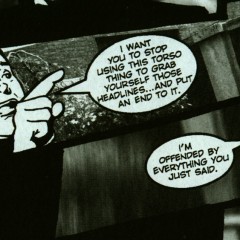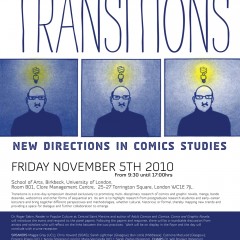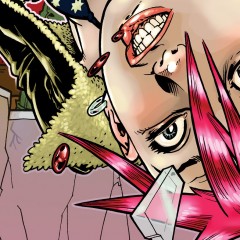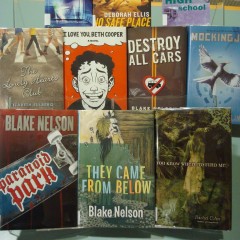Transitions 2
5 November 2011 Transitions Comica Symposium is an annual one-day symposium promoting new research and multi-disciplinary academic study of comics/ comix/ manga/ bande dessinée and other forms of sequential art. The event takes place in the autumn, and is hosted by Birkbeck, University of London as part of the annual Comica London International Comics Festival. Transitions is currently the only regular academic comics event based in London. The symposium provides a platform where different perspectives and methodologies can be brought together and shared. As an event devoted to promoting new research into comics in all their forms the symposium provides a forum for research from postgraduate students and early career lecturers. Comics studies occupy a unique multi-disciplinary middle-space, one that encourages cross-disciplinary pollination and a convergence of distinct knowledges: literary and cultural studies, visual arts and media, modern languages, sociology, geography and more. By thinking about comics across different disciplines, the Transitions team hopes to stimulate and provoke debate, to address a wide spectrum of questions, to map new trends, and to provide a space for dialogue and further collaboration to emerge. transitions.symposium@gmail.com The second Transitions event was held in November 2011. The event had now expanded to include parallel sessions and a large number of contributors. The primary organizer was again Tony Venezia (Birkbeck). Programme Keynote address: Professor Kent Worcester (Marymount Manhattan College): The Making of A Comics Studies Reader Panel 1: Archives & Publishing Chair: Dr. Paul Williams (Exeter) Sina Shamsavari (Goldsmiths/artist): Gay Ghetto Comics: Constructing a Dominant Gay Habitus Casey Brienza (Cambridge): Manga Revolution or Logical Evolution? Field Theory on the Rise & Demise of Tokyopop's U.S. Publishing Programme Lina Ghaibeh (American University, Beirut): Propaganda in Comics in the Arab World: From Nationalism to Religious Radicalism Respondent: Dr. Roger Sabin (University of the Arts) Panel 2: Adaptation & Appropriation Chair: Paul Gravett Armelle Blin-Rolland (Bath): Fidelity vs. Appropriation in Comic Adaptation: Jacques Carelman's & Clément Oubrerie's Adaptations of Queneau's Zazie dans le metro Nicolas Pillai (Warwick): The Laughing Fish and the Killing Book: From Comic Book to Cartoon & Back Again Aswathy Padmasenan (University of Delhi/Consultant Editor, Campfire Publications): Adaption/Adoption of Hamlet: a Graphic Retelling of the Classic Respondent: Dr. Julia Round (Bournemouth) Panel 3: Histories & Reading Chair: Daniel Marrone (London Consortium) Nina Mickwitz (UEA): After the Deluge – Everyday Tactics & Representational Strategies in a Time of Crisis Scott Jeffrey (Stirling): The Silver Age Superhero as Psychedelic Shaman Michael Goodrum (Essex): “Oh, c’mon, those stories can’t actually count in continuity!”: Squirrel Girl and the Problem of Female Power Panel 4: Transmedia & Remediation Chair: Zara Dinnen (Birkbeck) Daniel Merlin Goodbrey (Hertfordshire/artist): Game Comics: Read or Play? Craig Smith (Queen's U....
Transitions 1
5 November 2010 Transitions Comica Symposium is an annual one-day symposium promoting new research and multi-disciplinary academic study of comics/ comix/ manga/ bande dessinée and other forms of sequential art. The event takes place in the autumn, and is hosted by Birkbeck, University of London as part of the annual Comica London International Comics Festival. Transitions is currently the only regular academic comics event based in London. The symposium provides a platform where different perspectives and methodologies can be brought together and shared. As an event devoted to promoting new research into comics in all their forms the symposium provides a forum for research from postgraduate students and early career lecturers. Comics studies occupy a unique multi-disciplinary middle-space, one that encourages cross-disciplinary pollination and a convergence of distinct knowledges: literary and cultural studies, visual arts and media, modern languages, sociology, geography and more. By thinking about comics across different disciplines, the Transitions team hopes to stimulate and provoke debate, to address a wide spectrum of questions, to map new trends, and to provide a space for dialogue and further collaboration to emerge. transitions.symposium@gmail.com The first Transitions event was held in November 2010, on the initiative of Tony Venezia, who was writing a doctoral thesis centred on the work of Alan Moore. Programme Introductions Dr. Anthony Bale (Birkbeck); Paul Gravett (Comica director); Dr. Roger Sabin (University of the Arts) Panel 1: Superheroes Chair: Ariel Kahn (Roehampton) Maggie Gray (Middlesex): “Nothing but flat, dead wood”?: Comics and Ecocriticism Ian Hague (Chichester): Adapting Watchmen Ben Little (Middlesex): The Caped Bolshevik: The Dark Knight Returns and Miller’s Shifting Class Discourse Panel 2: Comics International Chair: Will Brooker (Kingston) Maria Vaccarella (King’s College London): Graphic Storytelling in the Medical Humanities Chris Howard (SOAS): Manga and Postmodernism Catriona MacLeod (Glasgow): Francophone comics and the (Post-)Colonial Utopia Panel 3: New Archives Chair: Paul Gravett Sarah Lightman (Glasgow): Why am I curating Graphic Details: Confessional Comics by Jewish Women? Ernesto Priego (University College London): 21st Century Comics: Comics as Migrant Art Panel 4: Artists & Scholars Chair: Alex Fitch (Resonance FM) Nicola Streeten (Lincoln): An Experience of Research: a Research of Experience – Embedding the Anecdotal in the Academic Sarah Zaidan (Kingston): The Adventures of MetaMan: The Male Superhero as a Metaphor for Modern Western Masculinity Response Dr. Roger Sabin followed by discussion. Wine Reception ...
First Contact
The ‘First Contact’ Research Cluster First Contact is a group of researchers at Birkbeck College in the School of Arts, both faculty and students. Our work is focused on science fiction, weird fiction and ‘slipstream’ literature, but investigates the implications of technocultural transformation in modern narrative through a wide diversity of forms that include literature, film, comics, photography, art, and cultural history. We meet informally as a support group for our individual projects and to explore the potential for collaboration. We meet formally through Birkbeck’s Centre for Contemporary Literature, but like to think we are slowly corrupting its DNA to produce new kinds of hybrid monsters. Our ambition is to set up a series of Futurological Congresses to explore a number of inter-related SFnal themes. Since we are all committed to the idea that this fiction is good to think with, we envisage First Contact as a think tank dedicated to wrestling the future back from apocalyptic forces intent on cancelling it. Recent publication highlights: Martin Eve, Password (Bloomsbury, 2016) H. G. Wells, The Time Machine, edited by Roger Luckhurst (Oxford World’s Classics, 2017) Faculty includes: Heike Bauer teaches on 21st century feminism and fiction and writes on graphic narratives, co-editing special issues of Studies in Comics and Journal of Lesbian Studies. Mark Blacklock teaches Science Fiction at Birkbeck and convenes the MA in Cultural and Critical Studies. His first monograph, The Emergence of the Fourth Dimension, forthcoming from Oxford University Press in 2017, investigates the roots of the science-fictional idea of higher-dimensional space, reading its imaginative forms in work by H.G. Wells and H.P. Lovecraft. He has recently published articles on Ben Wheatley’s adaptation of J.G. Ballard’s High Rise and New Horror Theories and is planning a research project into science-fictional languages. Dr Blacklock is also a novelist and writer for the national press. Joseph Brooker is Reader in Modern Literature at Birkbeck: author of books on Irish modernism and on British writers of the 1980s, he is now writing a book centred around the US novelist Jonathan Lethem which explores questions of genre hybridity, the relations of SF to mainstream fiction and other genres, and new connections between contemporary writing and literary history. Caroline Edwards is completing a book about time in contemporary fiction. She is co-editor with Tony Venezia of China Miéville: Critical Essays (Gylphi, 2015). An expert on dystopian and utopian narratives, she is often invited to discuss these topics in public forums and national media. Dr Edwards is currently co-editing a Special Collection on ‘Powering the Future: Energy Resources in Science Fiction and Fantasy’ with Graeme Macdonald for the Open Library of Humanities. Martin Eve specialises in...
Talking Shop: Dr Harriet Earle
This is the first of a new series of interviews in which we invite people working in the contemporary field to tell us about their work and share their sense of what's interesting. Dr Harriet Earle is currently an Associate Lecturer at Birkbeck, whose book on trauma and conflict in comics will be published in 2017. CCL: Do you think there is now a comics canon? (Or would you use a different term?) If so, what's in it? And who makes it? — artists, publishers, fans, academics? Is there, for instance, a distinct academic canon of comics that is different from other canons? Harriet: Canon is a good word – we can use that. As for what’s in it… all the comics that even non-comics-readers have heard of! Spiegelman’s Maus, Moore and Gibbons’ Watchmen, and Miller’s The Dark Knight Returns are three key texts that were all published in 1986 – something of a big year for comics – and a good starting point for any discussion of the canon. More recent additions would include Thompson’s Blankets, Bechdel’s Fun Home and Gaiman et al’s (mind-blowingly brilliant) series The Sandman. There are some artists whose entire corpus is worthy of a place in the canon: Sacco and his comics journalism, Alan Moore, Grant Morrison, Chris Ware, Frank Miller and Bryan Talbot. As for who makes it? Who makes any canon? It’s a tricky question because there are so many threads to it. However, with comics I think there’s another angle that does particularly interesting things to the comics canon – awards. There are many comics awards that are prestigious within the field but these are rarely mentioned anywhere except the jackets of the books (and comics-specific press coverage). What people do hear about is when a comic is honoured in a non-comics specific forum. Maus won a Pulitzer in 1992, Watchmen was the only graphic novel to appear on Time's 2005 "All-Time 100 Greatest Novels" list and Persepolis ranked #5 on Newsweek’s list of the ten best fiction books of the decade. This is not to say they aren’t well-crafted narratives that deserve recognition, but the recognition they do get seems above and beyond that which, say, an Eisner Award winner would receive because they have broken out of their own category. As for a distinct academic canon – I don’t know if it would differ too greatly from the ‘general’ comics canon. We’re still squeamish about giving superhero narratives too much kudos (despite there being some brilliant superhero comics out there – Magneto: Testament, Arkham Asylum: A Serious House on Serious Earth and Tank Girl) so these tend to be missing (or at least under-represented)...
Coming Of Age Stories: Now & Then
Tuesday 28th June 2016 Coming Of Age Stories: Now & Then From the Bildungsroman to Young Adult Fiction A lecture by Professor Phil Cohen In this special event hosted by Birkbeck’s Centre for Contemporary Literature, Professor Phil Cohen will reflect on the transformations of the ‘coming of age’ narrative. Professor Cohen will explore how such stories have changed from the classical bildungsroman to adapt to the ‘just in time’ production of the self in more recent times, and the foreclosure of transitions to adulthood currently being experienced by generations x, y or beyond. In this context, Professor Cohen will discuss the emergence of Young Adult fiction as a distinctive genre, as well as the changing grammars of life story telling. Following his talk, Professor Cohen – an ethnographer who has researched and written widely about youth cultures – will welcome questions and open discussion on the issues raised. Time: 6-7:30pm Venue: 124, 43 Gordon Square All welcome. Image: Young Adult Fiction – September 2010 by Pesky Librarians, used under a CC BY-NC-ND 2.0...






Recent Comments